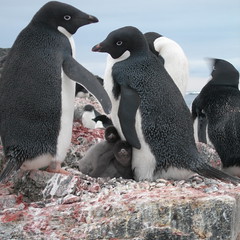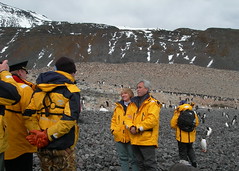When you look at a map, the South Shetland Islands and the Antarctic Penisula are not far away. They are of a piece, especially when you consider the distances travelled to get there. Yet when we settled in for sleep on December 20th, 2006 we were feeling a sense of "we're not quite there yet".
Overnight we cross the Bransfield Strait, heading for the Antarctic Sound at the northern tip of the peninsula. Our destination is Paulet Island. The accelerated progress we made across the Drake is going to make is possible for us to take a rare (for this sort of excursion) trip down the eastern side of the peninsula to see tabular icebergs and the shelf ice that is their source.
Martin wakes us with news that the sound and our targets south have more free ice than expected. Our pace would be too slowed to also allow some of our plans on the western side of the peninsula so after Paulet, rather than heading south, we'll retrace some of our steps back west to hit some of the western highlights. This is standard procedure for these trips. Two things control our fate: The weather and the presence of other groups (we hope to avoid them and the penguins and other wildlife don't want to be overwhelmed, but see Impacts of Tourism).
Editors Note: I apparently felt differently about this day closer to when it happened, so I present a bit of a juxtaposition below. First is what I wrote in my aborted attempt at a daily (or close to journal). Then is a combination of what I planned to write today (January 7th) and what I told a friend a couple of days ago. I think this highlights the degree to which the passengers on the Multanovskiy became close as well as the way in which time in a world with few people makes the human-ness matter in reflection. It also shows that the wholeness of the experience comes in reflection and I could only hope to capture details while it happened.
Landed at an Adelie Colony. Paulet Island. Many many thousands of penguins nesting on a gravel beach and up a steep hill. Chicks still on the nest, eating regurgited food. The smell of guano everywhere. Seals. Blue Eyed comorants. An old hut from a Swedish expedition.
One penguin had a broken leg and could not stand up. It was trying to drag itself to safety, with little success. It's that endless question of what to do with an injured animal out in the wild. The very wild. Sean and I watched it for a while but there was nothing to do.
We watch our arrival at Paulet Island from the deck. It's not the official continent (still an island) but we can tell, this is the real thing: There are icebergs and out there where we are going to land are more penguins than we can fit in a single look. They spread the width of the beach and go up the surrounding hills. We're told there are more around the corners where we can't see.
To board the zodiacs we must first wash our boots in an anti bacterial solution. We scrub with this stuff whenever we leave for or return from land. We go on shore. What one does on a landing is walk around, looking at things and taking pictures. Many pictures. What I experienced when landing was the smell. Penguin shit. It's all over the place and it smells. With time it will become familiar and welcoming but this first go round the stench and the numbers it overwhelming.
The captain of the boat comes on shore. Even though this is our first landing this seems special. Unbeknownst to us, two passengers are to wed, right there on the beach, and the captain will officiate.
After Paulet Island we head to Brown Bluff, our first continental landing. It's just a few days in, and I'm already starting to get wigged out by the presence of people. Once on land I wander uphill, away from beach, away from the clicking cameras. I sit in the snow and watch penguins on their highways up from the beach to the high rent district. I see some breadth to the penguin life cycle: A pair mates (he stands on top of a prone her); a couple builds a nest from stones; one warms an egg; another has a chick and an egg; another feeds two chicks.
As I sit I assume I'm looking south when I look out to sea, but it's actually north. There's no way to tell. The sun exists somewhere beyond a thick layer of clouds. It's possible to see miles and miles in Antarctica and think an attractive peak is small and not far away. It's usually huge and distant.
On our way out of the Antarctic Sound we stop at the small Gourdin Island. It's mostly inaccessible but our clever zodiac drivers wend their ways through rock and ice hazards to a small and hidden beach. When we arrive there are more penguins than we expect. Some have chicks in nests where normally we would walk about. Rather than disturb them, we constrain ourselves to a very small chunk of rock. It's very beautiful here. We are in a small and secluded place. The bigness of our new world is masked and we're amongst ice polished rock that I would love to run around and scramble upon. The penguins have dibs.
We'll sail overnight back into Bransfield Strait to arrive at Deception Island on December 22nd, 2006.

